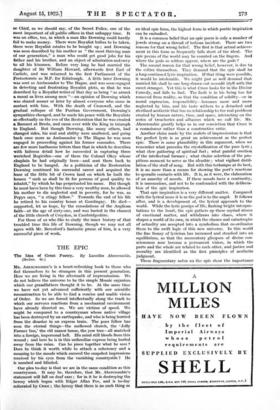A PERFIDIOUS ROGUE
The Godfather of Downing Street : Sir George Downing, 1623-1684. By John Beresford. (Cobden-Sanderson. 15s.) TIIER.E is something fa.scinatinz about the thought of Downing Street. We like to recall the great men who have lived there, and the conferences that have been held, and the events that have been discussed in this quiet side street, with its simple, unpretentious name. Number ten, Downing Street—what an admirably plain address it makes for the official residence of a Prime Minister ! There is an English reserve about it. In other countries they would have made more fuss. Why worry then to enquire who this Downing was ? Like General Martinet or Major Boycott or Mr. Hansard or Lord Sandwich, he has achieved, almost by accident, an immortal name. Is not that enough for him ? So in our idleness we were inclined to leave the matter. But Mr. John Beresford has thought otherwise. In his opinion Sir George Downing, Scoutmaster- General, Ambassador at The Hague and Secretary to the Treasury, has " abundantly deserved a full-dress biography," and while Mr. Beresford has thus produced the portrait of a most unpleasant person, so that you feel that Pepys' de- scription of him as a perfidious rogue was not far out, he has given us at the same time a very interesting and well- documented book.
Born at the end of the reign of James I., George Downing was brought up a Puritan of the Puritans. His father was Emmanuel Downing, an Attorney of London, his mother a sister of the admirable John Winthrop, Governor of the Plantacion of Massachusetts, whose letters are well known to all good Americans. In the year 1638, when George was fifteen years old, his parents decided to join their famous kinsmen in Massachusetts, then a community of about 12,000 persons, and George became a scholar of the newly-founded Harvard College, and one of its first graduates. At the age of twenty he was appointed an instructor in religion to the seamen in the West Indies, and in a letter to his cousin, the son of the Governor, belonging to this period, he signs himself not inappropriately " your truly obsequious cousin and servant." Two years later, however, when the Puritan cause had triumphed at Naseby, George Downing was again in England as preacher in Fairfax's army, and chaplain in the regiment of a certain Colonel Okey, whom he afterwards sent to the gallows. It was now that his great chance came to him. In the year 1649, at the age of twenty-six, he was appointed by Cromwell to the office of Scoutmaster-General.
or Chief, as we should say, of the Secret Police, one of the most important of all public offices in that unhappy time. It was an office, too, in which a man like Downing could hardly fail to make money. There were Royalist bribes to be taken, there were Royalist estates to be bought up ; and Downing was soon described by his mother as " the most thriving man of our generation," a man who could get good jobs for his father and his brother, and an object of admiration and envy to all his kinsmen. Before very long he had married the daughter of Sir William Howard, afterwards first Earl of Carlisle, and was returned to the first Parliament of the Protectorate as M.P. for Edinburgh. A little later Downing was sent as Ambassador to The Hague, and was soon engaged in detecting and frustrating Royalist plots, so that he was described by a Royalist writer of that day as being " as arrant a rascal as lives among men "—an opinion of Downing which was shared sooner or later by almost everyone who came in contact with him. With the death of Cromwell, and the gradual collapse of the Puritan Government, Downing's sympathies changed, and he made his peace with the Royalists so effectually on the eve of the. Restoration that he was created a Baronet at Breda, and came over with the King in triumph to England. But though Downing. like many others, had changed sides, his zeal and ability were unaltered, and going back once more as Ambassador to The Hague he was soon engaged in proceeding against his former comrades. There are few more loathsome letters than that in which he describes with hideous detail how he succeeded in capturing three wretched Regicides—one of them the Colonel Okey whose chaplain he had originally been—and sent them back to England to be hanged. As a politician of the Restoration Downi g continued his successful career and acquired the lease of the little bit of Crown land on which he built the houses " such as shall be fit for persons of good quality to inhabit," by which he has perpetuated his name. But though he must have been by this time a very wealthy man, he allowed his mother to die neglected and in poverty, for he was, as Pepys says, " a stingy fellow." Towards the end of his life he retired to his country house at Gamlingay. He died— supported, let us hope, by the consolations of the Anglican faith—at the age of sixty-one, and was buried in the chancel of the little church of Croydon, in Cambridgeshire.
For those of us who like to study the inner history of that troubled time this life of Downing, though we may not all agree with Mr. Beresford's fantastic praise of him, is a very successful piece of work.







































 Previous page
Previous page